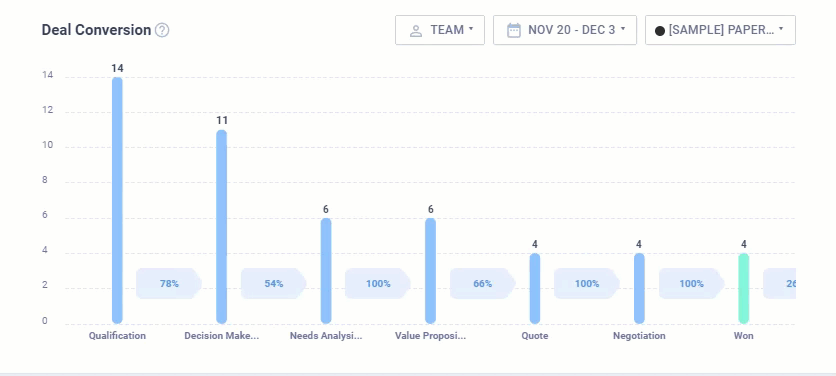Setting the Stage: Unveiling the Dynamics of Sales Performance
Sales performance is a critical aspect of any business, serving as the heartbeat that propels an organization toward success. At its core, sales performance refers to the effectiveness and efficiency with which a company’s sales team operates, striving to achieve and exceed goals. In this blog post, we’ll delve into the definition of sales performance and explore its paramount importance in ensuring business success.
It encompasses a myriad of activities and metrics that collectively gauge the efficacy of a company’s sales efforts. It involves evaluating how well a sales team converts leads into customers, meets revenue targets, and sustains long-term client relationships. Beyond mere numbers, sales performance also reflects the strategic prowess of a
Metrics that Matter: Unlocking the Revenue Impact in Sales Performance
Key Metrics and Revenue Impact
A cornerstone of sales performance lies in its ability to impact the bottom line directly. The primary metric that defines sales performance is revenue generation. The effectiveness of a sales team is often measured by its capacity to meet and exceed revenue targets. In turn, this directly influences the overall financial health of the business.
Customer acquisition, retention, and lifetime value are also pivotal metrics underpinning sales performance. The ability to attract new customers, retain existing ones, and maximize their lifetime value is a testament to the long-term viability of a business.
Driving Growth and Adaptability
Sales performance plays a pivotal role in driving business growth, presenting opportunities for expansion and market scaling. A high-performing sales team identifies and capitalizes on new markets, paving the way for the company to extend its reach and tap into previously untapped customer bases.
Furthermore, the adaptability of a sales team is crucial in the ever-evolving business landscape. The ability to innovate and stay competitive hinges on the agility of the sales force. A team that can swiftly respond to market changes, consumer trends, and competitive pressures is better positioned to not only survive but thrive in dynamic business environments.
Accelerating Success: Navigating Growth and Adaptability in Sales Performance
Sales performance plays a pivotal role in driving business growth, presenting opportunities for expansion and market scaling. A high-performing sales team identifies and capitalizes on new markets, paving the way for the company to extend its reach and tap into previously untapped customer bases.
The adaptability of a sales team is crucial in the ever-evolving business landscape. The ability to innovate and stay competitive hinges on the agility of the sales force. A team that can swiftly respond to market changes, consumer trends, and competitive pressures is better positioned to not only survive but thrive in dynamic business environments.
Sales performance is the linchpin for businesses seeking not only success but sustained growth. A high-performing sales team goes beyond meeting targets; it becomes a strategic driver for expansion and market scaling. By identifying and capitalizing on new markets, such a team opens avenues for the company to extend its reach, tapping into previously untapped customer bases.
This proactive approach not only injects vitality into revenue streams but also provides a resilient buffer against unpredictable shifts in the market landscape.
Tech Horizons: Pioneering the Future of Sales Performance
Role of Technology in Sales Performance
In the contemporary business landscape, technology is an indispensable ally in enhancing sales performance. Automation, data analytics, and customer relationship management (CRM) tools have become integral components of a high-functioning sales ecosystem. These technologies streamline processes, provide valuable insights, and empower sales teams to make informed decisions.
The role of technology in sales performance extends beyond efficiency gains. It also plays a pivotal role in enhancing customer experience, making it a critical factor in customer acquisition and retention. Businesses that leverage technology effectively create seamless, personalized interactions that resonate with modern consumers.
Emerging Trends Shaping the Future of Sales
As we navigate the ever-evolving landscape of sales performance, several emerging trends are shaping the future of the field. Artificial intelligence (AI) and machine learning are becoming increasingly prevalent, offering predictive analytics that enable sales teams to anticipate customer needs and behavior. Virtual and augmented reality are also gaining traction, providing immersive experiences that can revolutionize the way products and services are presented and sold.
Additionally, the rise of remote work has transformed the dynamics of sales, with virtual selling becoming more prevalent. The future of sales performance will likely see a continued emphasis on digital communication tools, collaboration platforms, and virtual selling techniques to adapt to the changing nature of work.
Nimble Sales Tools
Nimble CRM transcends conventional solutions by offering features that redefine sales excellence. Its intuitive interface simplifies deal management, ensuring sales professionals can navigate and close deals with ease. The platform’s reporting capabilities provide real-time insights, empowering teams to make data-driven decisions and adapt strategies promptly. Nimble’s collaborative capabilities for sales teams extend to team-based reporting, fostering a shared understanding of performance metrics and optimizing overall efficiency.
Takeaways: Crafting a Synthesis of Essential Insights in Sales Performance
In essence, sales performance is the heartbeat of business success, influencing revenue generation, customer relationships, and overall adaptability. Key metrics, such as revenue impact, customer acquisition, retention, and lifetime value, showcase the tangible outcomes of effective sales performance.
The integration of technology, both current and emerging, amplifies the impact of sales performance. From automation and data analytics to AI and virtual reality, technology is reshaping the landscape and providing new avenues for sales teams to excel. The emphasis on nimble tech tools underscores the importance of adaptability in the face of rapid change.





